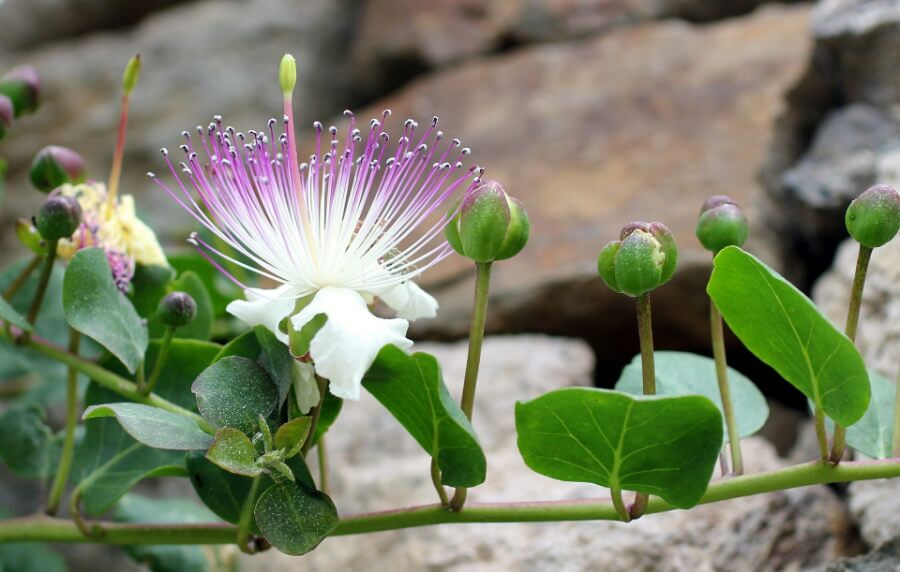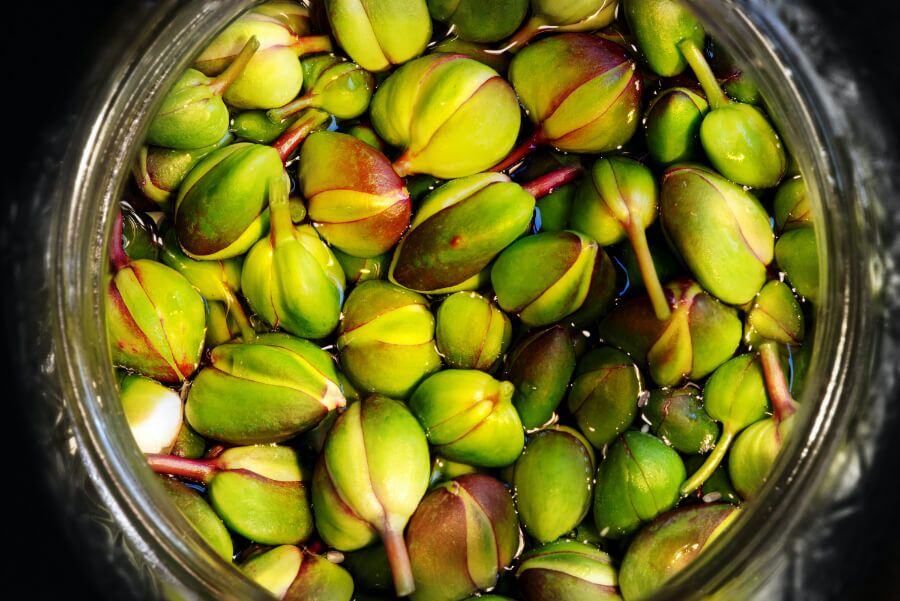Your cart is empty.
SUBTOTAL
£0.00

Here’s everything you need to know about these small buds called capers and how to cook with them.

Capers are the small flower buds of the Capparis spinosa, or caper bush. This perennial plant has rounded leaves and white to pinkish flowers. It’s native to the Mediterranean and dates back to at least 2,000 BC — they’re mentioned in the Gilgamesh, the oldest written story documented on ancient Sumerian clay tablets.
When the buds are dark green and about the size of a kernel of corn, this is when they’re ready to pick. As the buds are too delicate to be machine picked, they’re hand-picked instead, which is why they’re pricey. Once they’re picked, the capers are dried and then either salted or preserved in brine. Capers are bitter on their own, so the salt helps bring out their lemony, olive-like flavour.
Capers are categorised by their size, with the smallest ones being the most expensive and sought after:
Capers are not to be confused with caper berries. These are the fruit of the plant, what is left when the buds are left to ripen. They’re much larger, about the size of an olive. Caper berries are also edible, and are often pickled or brined. They have a similar texture to a pickle or olive, and contain tiny seeds which give a subtle crunch.

In ancient Greece, capers were used as a medication to prevent gas. In the Old Testament of the Bible, it’s suggested that the caper has aphrodisiac properties.
Capers contain high amounts of antioxidants including quercetin and rutin. These help to reduce inflammation in the body and protect against diseases like heart disease, cancer and type 2 diabetes.
Although capers are low in calories (only around 25 in a small jar), they’re also high in sodium. This is worth bearing in mind if you’re keeping an eye on your salt intake.

Capers are found throughout Mediterranean, Middle Eastern and North African cuisine. They add a pop of funky brightness to dishes, and are best added towards the end of cooking to maintain their texture and flavour. There’s little prep needed which makes them such an easy ingredient to use. As they have quite a strong flavour, it’s best to use them sparingly, particularly the larger ones. Quite often recipes will call for the capers to be rinsed first to remove the salt and vinegar, allowing the flavours to come through more.
In Sicilian and southern Italian food, capers are an important ingredient where they’re used in pasta, pizzas, and meat and seafood dishes. In the south of Italy, capers are more commonly preserved in salt rather than brined. They’re a common ingredient in recipes like pasta puttanesca and chicken piccata.
In a similar way to lemon juice or pickles, capers can cut through rich, fatty ingredients. Add a helping of capers to a creamy pasta, or sprinkle on deviled eggs. Capers go well with lemons, and a dressing made with these two ingredients can really elevate any dish with chicken, fish or veal cutlets.
Capers pair beautifully with seafood, especially with oily fish like salmon, tuna or sea bass. If you prefer seafood mixed into a dish, try adding capers to a classic paella Valenciana. They also go well in a simple dish of lemon rice with parsley — a delicious way to change things up from plain boiled rice.
Capers are an important ingredient in tartar sauce. Here’s a great recipe for a quick and easy tartar sauce. You can also chop capers up and add them to other sauces and dips, like a hot tomato relish which accompanies this Tunisian dish of Djerba grilled prawns. Other recipes like this one for a tapenade will use capers in a puree.
Here are some more tasty recipes which use capers:

Capers are best kept in their brine and refrigerated in an airtight container. If they’re preserved in salt, they don’t need to be in the fridge — just keep them in an airtight container in your pantry.
Understanding Spices
Spices have long been integral to the UK's culinary landscape, adding depth, flavours, and richness to a myriad of dishes. From the pungent aroma of cumin in Indian curries to...
Read MoreUnderstanding Spices
Confetti is an essential part of any wedding day. Not only is it a wonderful way to greet a newlywed couple, but it also provides some beautiful photo opportunities. The...
Read MoreSeasonal Ideas
It’s no secret that any handmade gift will always be more special than a store-bought one. Homemade food gifts are especially wonderful, a labour of love that shows someone you...
Read MoreHealth and Wellbeing
It’s no secret that winter’s cold and gloomy weather makes us crave indulgent dishes like fondue and baked goods like sticky toffee pudding and apple crumble. While Christmas is the...
Read More